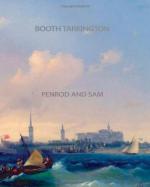From the cross-street which formed the side boundary of the Schofields’ ample yard came a jingle of harness and the cadenced clatter of a pair of trotting horses, and Penrod, looking up, beheld the passing of a fat acquaintance, torpid amid the conservative splendours of a rather old-fashioned victoria. This was Roderick Magsworth Bitts, Junior, a fellow sufferer at the Friday Afternoon Dancing Class, but otherwise not often a companion: a home-sheltered lad, tutored privately and preserved against the coarsening influences of rude comradeship and miscellaneous information. Heavily overgrown in all physical dimensions, virtuous, and placid, this cloistered mutton was wholly uninteresting to Penrod Schofield. Nevertheless, Roderick Magsworth Bitts, Junior, was a personage on account of the importance of the Magsworth Bitts family; and it was Penrod’s destiny to increase Roderick’s celebrity far, far beyond its present aristocratic limitations.
The Magsworth Bittses were important because they were impressive; there was no other reason. And they were impressive because they believed themselves important. The adults of the family were impregnably formal; they dressed with reticent elegance, and wore the same nose and the same expression—an expression which indicated that they knew something exquisite and sacred which other people could never know. Other people, in their presence, were apt to feel mysteriously ignoble and to become secretly uneasy about ancestors, gloves, and pronunciation. The Magsworth Bitts manner was withholding and reserved, though sometimes gracious, granting small smiles as great favours and giving off a chilling kind of preciousness. Naturally, when any citizen of the community did anything unconventional or improper, or made a mistake, or had a relative who went wrong, that citizen’s first and worst fear was that the Magsworth Bittses would hear of it. In fact, this painful family had for years terrorized the community, though the community had never realized that it was terrorized, and invariably spoke of the family as the “most charming circle in town.” By common consent, Mrs. Roderick Magsworth Bitts officiated as the supreme model as well as critic-in-chief of morals and deportment for all the unlucky people prosperous enough to be elevated to her acquaintance.
Magsworth was the important part of the name. Mrs. Roderick Magsworth Bitts was a Magsworth born, herself, and the Magsworth crest decorated not only Mrs. Magsworth Bitts’ note-paper but was on the china, on the table linen, on the chimney-pieces, on the opaque glass of the front door, on the victoria, and on the harness, though omitted from the garden-hose and the lawn-mower.
Naturally, no sensible person dreamed of connecting that illustrious crest with the unfortunate and notorious Rena Magsworth whose name had grown week by week into larger and larger type upon the front pages of newspapers, owing to the gradually increasing public and official belief that she had poisoned a family of eight. However, the statement that no sensible person could have connected the Magsworth Bitts family with the arsenical Rena takes no account of Penrod Schofield.




